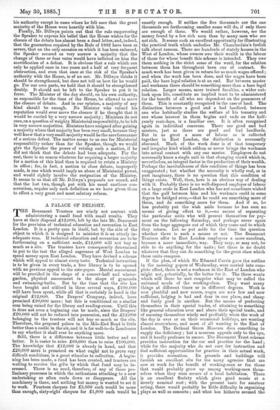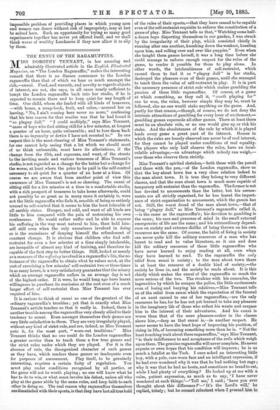A PALACE OF DELIGHT.
THE Beaumont Trustees are wisely not content with administering a small fund with small results. They have at their disposal £12,000, left by the late Mr. Beaumont
for the provision of technical education and recreation in East London. It is a pretty sum in itself, but by the side of the object to which it is designed to minister it is an utterly inadequate sum. If technical education and recreation are to be forthcoming on a sufficient scale, £12,000 will not buy so much as a site. The trustees have consequently determined to put to the test the alleged eagerness of West London to spend money upon East London. They have devised a scheme which will appeal to almost every taste. Technical instruction is to be given in every trade, a free library is to be opened with no previous appeal to the rate-payer. Mental amusement will be provided in the shape of a concert-hall and wintergarden, physical amusement in the shape of gymnasia and swimming-baths. But by the time that the site has been bought and utilised in these several ways, £100,000 will have been spent, while all that is certainly in hand is the original £12,000. The Drapers' Company, indeed, have promised £20,000 more ; but this is conditional on a similar sum being raised for the library and reading-room. Until this is done not even a beginning can be made, since the Drapers' £20,000 will not be reduced into possession, and the .12,000 belonging to the trustees will not buy so much as the site. Therefore, the proposed palace in the Mile-End Road is little better than a castle in the air, and it is for well-to-do Londoners to say whether it shall ever be anything more. Still, there is a difference between little better and no better. It is easier to raise £68,000 than to raise £100,000. The knowledge that £12,000 is already in hand, and that £20,000 more is promised on what ought not to prove very difficult conditions, is a great stimulus to collection. A beginning has been made, a fund has been created, and trustees are waiting to receive the gifts by which that fund may be increased. There is no need, therefore, of any of those preliminary processes in which the enthusiasm attaching to a new undertaking so often cools down or disappears. All the machinery is there, and nothing but money is wanted to set it to work. Fourteen cheques for £5,000 each would be more than enough, sixty-eight cheques for £1,000 each would be exactly enough. If neither the five thousands nor the one thousands are forthcoming smaller sums will do, if only there are enough of them. We would rather, however, see the money found by a few rich men than by many men who are not rich. It seems such an excellent opportunity for illustrating the practical truth which underlies Mr. Chamberlain's foolish talk about ransom. There are hundreds of stately houses in the West of London, whose owners owe their wealth to the labour of those for whose benefit this scheme is intended. They owe them nothing in the strict sense of the word, for the relation between them has throughout been one of contract. So much work has been given in return for so much wages offered ; and when the work has been done, and the wages have been paid, the bare legal relation is at an end. But between master and workman there should be something more than a bare legal relation. Larger means, more trained faculties, a wider outlook upon life, constitute an implied trust to be administered for the benefit of all who are dependent on the possessors of
them. This is constantly recognised in the case of land. The distinction between a good and a bad landlord, between,
one who habitually studies the welfare of his tenantry and one whose interest in them begins and ends on the halfyearly rent-days, is a familiar one. It is often recognised again in individual concerns. There are good and bad masters, just as there are good and bad landlords. But in so great a mass of labour as is collected together in East London, the distinction is necessarily obscured. Much of the work done is of that temporary and irregular kind which seldom or never brings the workman• into actual contact with any one master. Employers do not necessarily know a single unit in that changing crowd which is, nevertheless, an integral factor in the production of their wealth. Perhaps the inevitableness of this condition of things has been exaggerated ; but whether the necessity is wholly real, or in part imaginary, there is no question that this condition of things exists. Well, then, here is an obvious way of dealing with it. Probably there is no well-disposed employer of labour on a large scale in East London who has not sometimes wished that the gulf between him and his workmen could in some degree be bridged over,—that he could see something more of them, and do something more for them. And if so, he has probably put the wish aside because he has seen no means of giving effect to it,—no means of separating the particular units who will present themselves for payment on the following Saturday, and perhaps never again from the huge aggregate out of which they come and to which they return. Let us put aside for the time the question whether there is such a means or not. The Beaumont Trustees offer to East London employers a more excellent, because a more immediate, way. They may, or may not, be able to do anything for the units ; but there is no doubt whatever that they can do something for the great class which these units compose.
If the plan, of which Sir Edmond Currie gave the outline in the morning papers of Wednesday, were carried into complete effect, there is not a workman in the East of London who might not, potentially, be the better for it. The three wants which will there be met comprise what may be called the universal needs of the working-class. They want many things at different times or in different degrees. Work is now plentiful and now scarce, wages are now low and now sufficient, lodging is bad and dear in one place, and cheap• and fairly good in another. But the means of perfecting themselves in their special trades, of attaining to something like general education over and above their special trade, and of amusing themselves wisely and profitably when the work of the day is over or on their occasional holidays, are wanting almost everywhere, and most of all wanting in the East of London. The Bethnal Green Museum does something to supply the deficiency ; but a museum appeals only to the eye, and it hardly professes to amuse. The Beaumont Trust scheme provides instruction for the ear and practice for the hand ; while for the majority who do not care for instruction and find sufficient opportunities for practice in their actual work, it provides recreation. Its grounds and buildings will furnish an excellent site for the many agencies that are now at work for the benefit of working-men or for those that would probably grow up among working-men themselves when they were secure of a local habitation. There is an excellent Society which gives good music at a merely nominal cost ; with the present taste for amateur acting, there would probably be little difficulty in organising plays as well as concerts ; and what has hitherto seemed the
impossible problem of providing places in which young men and women can dance without risk of impropriety, may at last be solved here. Such an opportunity for trying so many good experiments together has never yet offered itself, and we shall think worse of wealthy Londoners if they now allow it to slip by them.















































 Previous page
Previous page